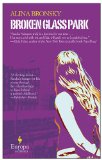Summary | Excerpt | Reading Guide | Reviews | Beyond the Book | Readalikes | Genres & Themes | Author Bio

Kind eyes. In fact, she’s nice in general, Maria.
Alissa took to her immediately—boom, just like that. Maria this, Maria that. Mascha, mine, ma-ma-ma-Mama. I wasn’t
upset with her about it—she’s just a little kid.
She immediately took up residence in Maria’s boundless lap. She wanted to stay there for days on end. It made Maria nervous because she had a hard time cooking with a two-yearold clinging to her. As if any of us wanted to eat. Anton and I didn’t eat for days. At some point he basically collapsed—and I piled on.
I told him that if he didn’t eat he’d be put in the hospital. And if that happened Maria would be deemed an unfit guardian and sent back to Novosibirsk. And then we’d be stuck in an orphanage or split up and sent out to foster homes alone.
He ate after that. I sat with him and watched him steadily chewing, his big, round eyes fixed on the white wall. Maria kept refilling his plate. Anton threw up twice after eating so I told Maria to stick to smaller portions, but to feed him frequently throughout the day. And not to give him such rich food. And to make sure he drank a lot.
Maria was a good cook. She still is. Much better than my mom. Maria knows how to make borscht and other complicated soups. The apartment always smells like food. She makes homemade stocks from chicken or beef, with vegetables and bundles of soup greens. She makes perfectly shaped meatballs and crepes as thin as cold cuts. She discovered sweetened condensed milk at the Russian grocery store around the corner—a delicacy more prized than caviar during Soviet times—and drenches stacks of crepes in it. She makes homemade pickles and blackcurrant jam.
We’re doing well, I tell my mother. We’re being fattened up nicely. I wish you could taste it all. You were always intrigued by anything tasty, interesting-looking, or out of the ordinary.
In the newspaper article, Maria was described as “the only living relative willing to look after the three children left behind.”
We weren’t left behind, I grumbled. And Maria didn’t sacrifice some priceless existence for our sake: when you work in a cafeteria in Novosibirsk and you’re asked if you’d like to
move to Germany to make soup for a few kids, you’ve hit the
lottery.
Particularly since Maria had only briefly been married once when she was young. Maybe twice. She had no kids and no pets—as far as she was concerned there was nothing to tie her to her studio apartment and the cafeteria. That’s turned out not to be true. I could have told her so. Back in Novosibirsk she could blather to everyone—and she did. Here she’s pretty much damned to silence.
After almost two years here, Maria’s German is limited to about twenty words, things like bus, potato, butter, trash, boil, wash, and fuck you—for the dark-haired teenagers who sometimes whistle and make vulgar gestures at her as she walks past them. Occasionally she tries to group her vocabulary into sentences.That usually doesn’t go too well.
When she’s shopping anywhere but the Russian grocery store, she has to point to whatever she wants and then write out the number she needs. She always carries a little notepad with her for exactly that purpose. Every time she comes back from the discount market she’s bathed in sweat. When she’s spoken to on the street, she whimpers and she gets red blotches on her face. I tried for two weeks to help her master the sentence “I only speak Russian.” She carries it around on a slip of paper in her wallet, transcribed phonetically into Cyrillic letters.
We’re visited regularly by the hyphenated names from the department of family services. Maria freaks out every time, and I have to spend a long time before and after their visits convincing her she is doing a good job and that she won’t have togo back to her job in the cafeteria.
Excerpted from Broken Glass Park by Alina Bronsky. Copyright © 2010 by Alina Bronsky. Excerpted by permission of Europa Editions. All rights reserved. No part of this excerpt may be reproduced or reprinted without permission in writing from the publisher.
Your guide toexceptional books
BookBrowse seeks out and recommends the best in contemporary fiction and nonfiction—books that not only engage and entertain but also deepen our understanding of ourselves and the world around us.